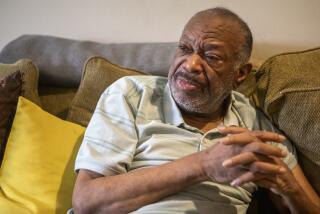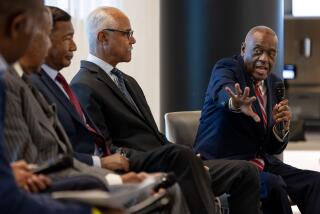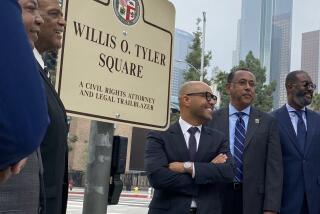Pioneer Black Judge Edwin Jefferson Dies
- Share via
Edwin L. Jefferson, the first black judge west of the Mississippi, has died in his Los Angeles home. He was 84.
Jefferson died Saturday night after suffering a stroke, his daughter, Susan, said Monday.
A veteran of 34 years on the bench of three courts, Jefferson, who never accepted the modern term “black” but insisted instead on identifying himself as a Negro, acknowledged at his retirement in 1975 that young black activists considered him an “Uncle Tom.”
“See where you are,” he would reply, “and see where I am.”
Jefferson was named to the Los Angeles Municipal Court in 1941 and elevated to the Los Angeles County Superior Court in 1949, the only black judge at those levels outside New York and the U.S. Virgin Islands.
He was appointed to the state 2nd District Court of Appeal headquartered in Los Angeles in 1961 and remained the state’s only black appellate justice until his retirement. He was succeeded by his younger brother, Bernard, now also retired.
Born in 1905 in Coffeeville, Miss., a predominantly white farming community, Jefferson and his two brothers and a sister were not allowed to attend school with the white children. So his father, a nearly illiterate carpenter, built a tiny schoolhouse in their yard, and his mother taught them.
The family moved to Los Angeles in 1921, and Jefferson worked his way through USC and its School of Law as a campus janitor and a steward on the Santa Catalina Island steamers. The only black in the law school, he was excluded from USC fraternities but insisted he never felt discrimination until he passed the California Bar in 1931.
When he received no invitation to join the “whites only” Los Angeles County Bar Assn., he protested--in vain. Ten years later, when he was named a judge, the association courted him.
“I said, ‘Hell, no, I wouldn’t belong to the goddamned thing!’ ” he told The Times many years later.
In his first Superior Court post 40 years ago, Jefferson was assigned to Long Beach. The president of the Long Beach Bar Assn., a transplanted Southerner, protested: “My grandfather would turn over in his grave if I had to say ‘your honor’ to a Negro.”
Jefferson retorted: “Tell him I don’t want to try any of his cases because my grandfather would turn over in his grave.”
Proud of being a judge “first, last and always,” Jefferson said he never showed favoritism because of race.
When a black defendant once said to him, “You’re one of us, and you’ve got a good chance to get even with these whites,” Jefferson recalled that he promptly threw the man in jail.
“I never belonged to the NAACP, fighting the cause. I wasn’t trained like that,” he told The Times. “I can’t set myself apart. I will not get into squabbles.”
Jefferson is survived by his daughter and two grandchildren, his two brothers and sister. His wife, Mattie Pearl, who was the sister of Rep. Augustus F. Hawkins (D-Los Angeles), died in 1982.
Services will be at 2:30 p.m. Thursday at Angelus Funeral Home, 3875 Crenshaw Blvd., Los Angeles.
More to Read
Sign up for Essential California
The most important California stories and recommendations in your inbox every morning.
You may occasionally receive promotional content from the Los Angeles Times.













